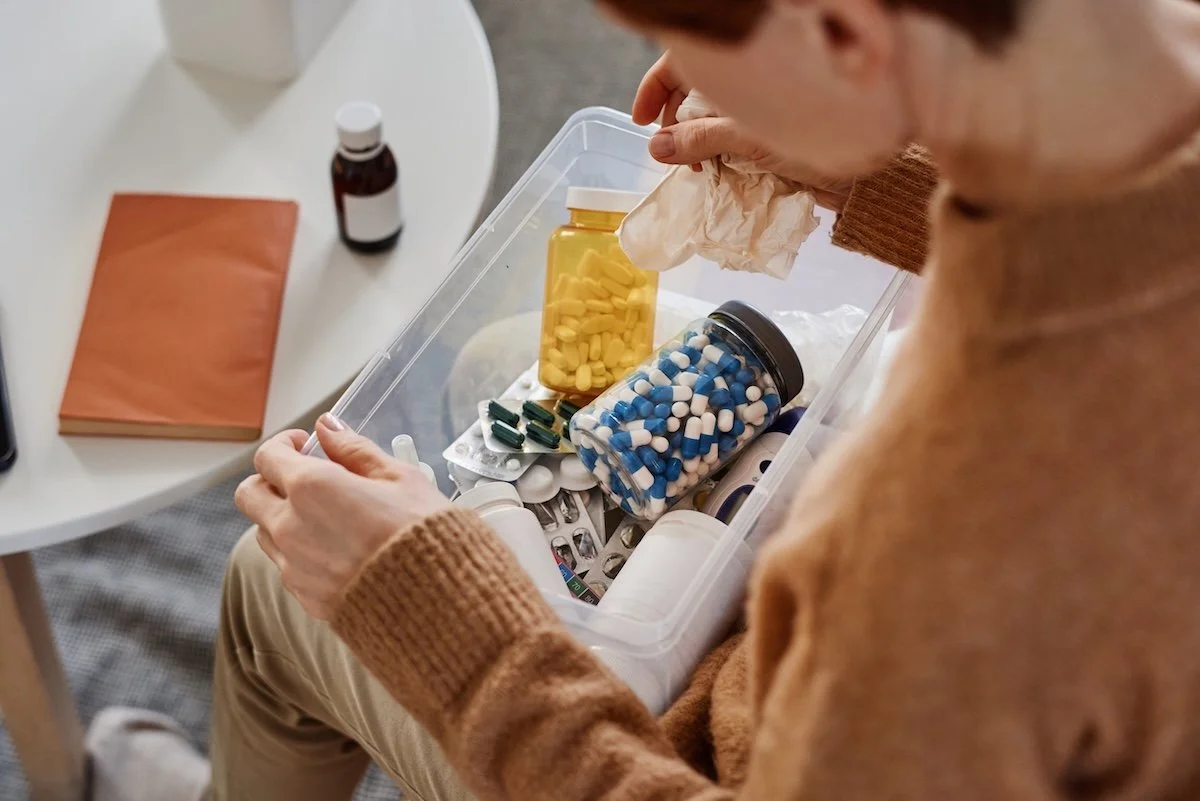Simplify Your Life Week: Declutter Your Medicine Cabinet for Safer Sexual Health
When you think about "simplifying your life," your first instinct might be to clean out your closet or reorganize the kitchen junk drawer. But there's another place where clutter builds quietly, and it can have a direct impact on your sexual health.
We're talking about your medicine cabinet.
In honor of Simplify Your Life Week, we're shifting the focus to an area that rarely gets attention in lifestyle roundups. For women in midlife, especially those managing perimenopause, menopause, or sexual wellness concerns, taking inventory of your medications and supplements is more than a tidy-up project. It's a way to get safer, more effective care, and potentially reclaim aspects of health and intimacy that you didn't realize were being disrupted by what's in that little mirrored cabinet.
The Hidden Impact of Medication Overload
It's surprisingly easy to accumulate medications over time. You might have:
A few leftover prescriptions from past infections or procedures
A shelf of supplements you bought after reading a wellness article
Multiple versions of the same over-the-counter pain reliever
Something a friend recommended that "really worked for them."
Now multiply that by the changes that come with midlife, shifts in hormones, new prescriptions for blood pressure or cholesterol, or sleep aids picked up in desperation after weeks of 3 a.m. wake-ups.
It's no wonder so many women experience symptoms they can't quite explain. Dryness. Low libido. Mood swings. Brain fog. Pain with sex. Fatigue that doesn't resolve with rest.
Sometimes, the culprit is not a single drug or supplement. It's the interaction between them. And that's where careful medication review becomes essential.
Medications That Can Quietly Disrupt Sexual Health
Certain medications are known to affect libido, arousal, lubrication, or orgasm. The list includes some familiar names:
Antidepressants (SSRIs and SNRIs): These can significantly impact sexual desire and orgasm, even when mental health improves.
Antihistamines: Often overlooked, but these can contribute to vaginal dryness by reducing natural moisture.
Birth control pills: Especially those with higher androgen-suppressing activity, which can lower testosterone and reduce libido.
Blood pressure medications: Beta blockers and certain diuretics are known to cause sexual side effects in all genders.
Sleep aids or sedatives: These can dampen both energy and sexual responsiveness.
Pain medications, especially opioids: These can interfere with hormone regulation and drive.
None of this means these medications are "bad." Many are necessary. But the effects on sexual health are often not discussed, or not recognized until years later, when they've quietly reshaped your relationship with your body.
Supplements Aren't Always Safer
There's a tendency to assume that "natural" means harmless. But supplements can interfere with hormone levels, medication absorption, or mood regulation. Some women take DHEA, maca root, or phytoestrogens hoping to support libido or energy, but those supplements can have unintended effects when layered on top of prescription hormones or antidepressants.
Worse, supplements are not always tested for quality or potency. If your sexual health has changed and nothing else seems to explain it, your supplement lineup might be worth a closer look.
The Power of a Medication Review in Concierge Care
One of the most underutilized aspects of concierge gynecology is comprehensive medication review. Most women have never had a provider sit down and look at their entire medication and supplement routine, let alone link it to their sexual health.
At The GSM Collective, we approach this review as part of your broader wellness picture. We don't just ask what you're taking. We ask:
When did you start it?
Why was it prescribed?
What has changed since then?
What are you taking over the counter?
What's helping, and what's just habit?
These questions help uncover patterns that are often missed. That antihistamine you've taken every summer? It might be the missing piece in your chronic dryness. The supplement you added six months ago? It might be interacting with your hormone therapy.
This isn't about throwing everything out. It's about intentional care. Knowing what serves you and what's just adding noise.
Creating a Safer, More Streamlined Cabinet
Here's a simple way to begin the declutter process at home:
Pull everything out. Don't just glance. Take it all out—prescriptions, supplements, vitamins, ointments, and mystery bottles.
Check expiration dates. If it's expired, dispose of it properly. Don't flush. Most pharmacies have drop-off bins for safe medication disposal.
Sort into categories: Prescription, Over-the-Counter, Supplement, Topical. This helps you see overlap.
Make a list. Create a complete inventory. This is especially helpful for your provider and for any future care needs.
Ask what's essential. Anything you're unsure about? Please bring it to your next appointment.
Not Just a Cleanup, A Reset
Your sexual health deserves the same level of attention as any other part of your well-being. That means looking beyond symptom management and into the systems, routines, and yes, even the medicine cabinet, that affect how you feel.
Decluttering isn't just about removing what's unnecessary. It's about creating space for what's meaningful, effective, and aligned with the woman you are now, and not the one you were when you started that bottle two years ago. Check out the podcast I did with Amy Ege, professional organizer, about the power of decluttering during perimenopause.
Let's Take a Fresh Look
If something feels off, whether it's libido, dryness, discomfort, or just not feeling like yourself, we can help you uncover the root. At The GSM Collective, Dr. Sameena Rahman offers deeply personalized care that doesn't rush, dismiss, or guess. You'll get time, attention, and expert eyes on every detail of your health.
Call 312-574-3434 or visit thegsmcollective.com to schedule a consultation. Your next chapter in sexual wellness might start with a fresh shelf.




